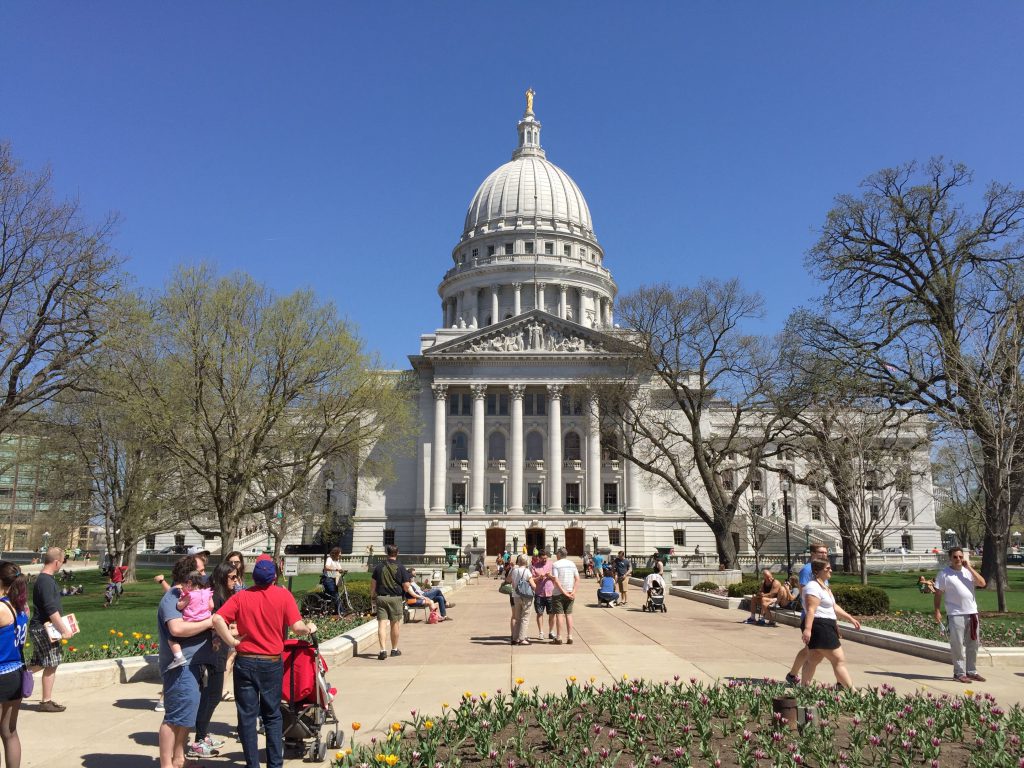Dueling Visions of the State’s Future
5 major areas where Evers, Republicans differ on state policies, spending.
The dueling budgets of Democratic Gov. Tony Evers and Republican legislators offer strikingly different visions of state government, what it should spend and its obligations to taxpayers in Wisconsin history.
Their budgets differ on health care, how much to increase state aid for K-12 schools, whether wealthy residents pay too little in income taxes, whether the minimum wage should be raised and whether medical and recreational marijuana should be legalized. Both budgets spend about the same on highways by mid-2021, but pay for it in much different ways.
Symbolizing those differences was the controversy over Evers’ order to fly the gay pride flag over the Capitol.
Republican Rep. Scott Allen, of Waukesha, led GOP criticism of that decision. If government sides with a group that has “devotion to a set of moral beliefs and practices, then it could be construed as religious,” Allen said.
But the fight over a flag was a sideshow, compared to the disagreements over the biggest – and most expensive – functions of state government. The five key areas of disagreement:
1. Health care: Evers wanted state law changed to expand Medicaid, which provides health care to one in five Wisconsin residents, to 82,000 more, largely using federal dollars to pay for the expansion, boost reimbursement rates and expand dental care dramatically.
But, “there is no way we are going to expand welfare in Wisconsin,” Assembly Speaker Robin Vos vowed. Vos said half of those 82,000 already have health insurance, so expanding Medicaid with federal dollars would upset that industry.
2. Tax policy: Evers wanted a middle-class tax cut and expansion of the Earned Income Tax Credit. He also wanted to raise $1 billion by limiting tax breaks now enjoyed by capital-gains investors and manufacturers. The governor’s message: Richest Wisconsinites, you aren’t paying your fair share of income taxes.
For their part, Republicans approved more than $500 million in income tax cuts, paid for by spending less than Evers sought on other programs and keeping the tax breaks targeted by Evers.
3. K-12 school aid: A former superintendent of public instruction, Evers wanted $1.4 billion more K-12 schools, including $600 million more for special education.
Too expensive, Republicans countered, offering Evers about $500 million less. And, instead of $600 million more for special education, how about $100 million more – the biggest increase in 10 years?
4. Paying for highways: Evers wanted an 8-cent per gallon increase in the 30.9-cent gas tax, tying future increases to inflation, and raising heavy truck registration fees by 27 percent. His package would have raised more than $600 million to rebuild highways by mid-2021.
Instead, Republicans decided to raise the $75 vehicle registration fee to $85, more than double (from $69.50 to $164.50) the fee for a vehicle title, add a new $75 fee on all hybrid vehicles and a transfusion of $90 million from the state general fund to the Transportation fund.
5. State government finances: Evers proposed that state government spend $83.76 billion over the next two years, or 8.2 percent more than the current budget. His budget also wiped out a budget surplus.
Republicans trimmed that two-year spending increase to about 5 percent, which two conservative GOP senators said is still too much.
Joint Finance Committee Cochair John Nygren said it was irresponsible for Evers to build a budget on “expanding welfare, taking federal money, raising taxes by $1 billion on income, raising taxes by $1 billion on property, and still ending with a structural deficit.”
But Democrats said Republicans ignored what Evers called the People’s Budget. “You [Republicans] favor the people who don’t need it,” said Democratic Rep. Chris Taylor.
In the governor’s vision of Wisconsin, the minimum wage goes up annually to $15 per hour and first-time home buyers claim an annual tax credit of $5,000 toward that purchase. And, it would not be a crime to possess up to 25 grams of marijuana.
Republicans share none of those visions of the future.
Steven Walters is a senior producer for the nonprofit public affairs channel WisconsinEye. Contact him at stevenscotwalters@gmail.com
The State of Politics
-
RNC Brings Fame to Gen Z Party Leader
 Jul 15th, 2024 by Steven Walters
Jul 15th, 2024 by Steven Walters
-
Wisconsin’s Republican Roots Run Deep
 Jul 8th, 2024 by Steven Walters
Jul 8th, 2024 by Steven Walters
-
Feuding Supreme Court Justices Need a Break
 Jul 1st, 2024 by Steven Walters
Jul 1st, 2024 by Steven Walters






















